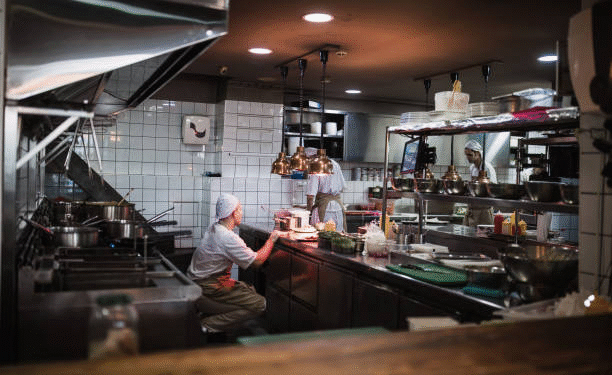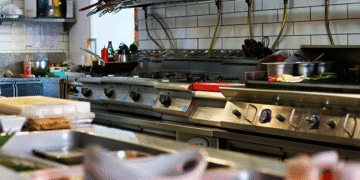Introduction
The restaurant industry is evolving at a rate that has never been experienced. The future of the commercial kitchens is being reinvented in terms of sustainability, automation, or both, with innovation and efficiency. Today even the restaurants are not about delivering the good food to the people but the optimization of all the processes in the restaurant. With the rise of the new and advanced commercial kitchen equipment as well as smarter restaurant kitchen appliances, the operators and the cooks employed in the restaurants have now the opportunity to be more creative and not so burdened with the routine tasks.
The kitchen as we know it today will have a very different future due to the shift in the consumer expectations and the constantly increasing levels of technological improvement. We will now refer to the trends that are changing this and how it is shaping the future of the restaurant’s operations.
Smart Technology Revolutionizing Kitchen Operations
Smart technology has been one of the largest changes in the kitchen of the modern world. Since AI-enabled fryers and IoT-enabled ovens have become a reality, the modern commercial kitchen is developing equipment that is capable of thought, learning, and changing. Such intelligent systems have an automatic feature of adjusting the cooking schedules, tracking of food temperatures, and even notifying when they need attention.
Restaurants using smart kitchen gear get live updates to improve meals while cutting down on trash. Take high-tech fridges – they track how fresh stuff is, then alert staff when things start going bad. When cooking gets automated, every plate comes out consistent in flavor and look. Doing it by hand just won’t give you that kind of accuracy.
Sustainability: The Core of Modern Commercial Kitchens?
Sustainability is now more than a buzzword, it is a necessity. Green commercial kitchenware is made to save on energy usage, they consume less water and are also made to encourage responsible sourcing. Induction cooking such as that is now becoming the norm in contemporary restaurants due to the fact that it is faster to heat, consumes less electricity and keeps the kitchen cool.
Restaurant kitchen appliances that consume less energy not only assist in minimizing cost of operations, but also share the same values with the customers. Diners are more and more inclined to go to a restaurant that is environmentally responsible, and sustainable kitchens have a significant part in it. Some of the examples of technologies that are transforming the ecological footprint of the kitchen include composting systems, low-flow dishwashers & energy-smart ventilation units among others.
Automation and Robotics in the Restaurant Kitchen?
The most futuristic trend in commercial kitchens has been the integration of robotics. Robotization of kitchens through the use of robotic arms to flip burgers to automated machines to make salads are changing the way kitchens operate. Through the use of smart commercial kitchen devices, some of the most tedious jobs like chopping, frying or serving can be automated, which minimizes human error and burdens the labor force.
Also, robotic systems that have been incorporated into appliances in restaurants of commercial kitchen equipment are supposed to cooperate with chefs without any issue. This is the cooperation between humans and machines to enhance accuracy, safety, and speed—restaurants can effectively cope with large amounts of orders and do it quickly, including at the busiest time.
Modular and Flexible Kitchen Designs
The kitchen design has been put in the limelight of flexibility by the post-pandemic world. Diners are currently favoring modular designs that can be redesigned with ease to suit the evolving menu needs or service provisions. Small and footprint-efficient commercial kitchen appliances allow companies to utilize small spaces to the best and adjust to the emerging trends in the industry such as cloud kitchens or food delivery hubs.
This flexible strategy also applies to the appliances in the kitchen of the restaurants. Manufacturers are withholding smaller multi-purpose food tools that can cook, bake, and grill all into one device—perfect in the small high-efficiency spaces. The outcome is an all-purpose and scalable kitchen.
Predictive Maintenance Insights
Kitchen management is becoming a strong instrument of data analytics. The contemporary commercial kitchen appliances are equipped with inbuilt sensors that record on the use, energy consumption, and performance. The data assists restaurant owners with making smarter operational choices—when to do the maintenance or change the equipment.
Predictive maintenance really helps out. It keeps kitchen gear running right in eateries by warning staff before something might break down. Because of this heads-up, folks spend less time fixing things, dodging big repair bills, while still serving customers just as well – keeping the business strong and guests coming back.
Health, Safety, and Hygiene Innovations
Hygiene and food safety are now the priorities after COVID. The current innovations in commercial kitchen equipment include touchless technology, antimicrobial surfaces and self-cleaning. The new standards of cleanliness are being established by automated sanitization machines and sterilization devices based on UV light.
On the same note, restaurant kitchen appliances are being fabricated using cross-contamination and bacteria resisting materials. These innovations assist restaurants to be in line with safety standards and also to ensure that customers are not in doubt. Hygiene technology together with adequate food handling practices will bring a safer and more efficient kitchen environment.
The Human Element: Balancing Technology and Creativity
Although automation and intelligent technology are taking over the future of commercial kitchens, nothing can replace human touch. Chefs and kitchen employees inject creativity, enthusiasm and art to each meal. Modern commercial kitchen equipment and smart restaurant kitchen appliances are meant to aid in that ingenuity rather than to substitute it.
Technology helps chefs eliminate repetitive duties and ease errors, allowing them to concentrate on what is important; innovation, flavour, and guest satisfaction. The future kitchens will then depend on cooperation between human ability and machine accuracy.
Last Word: A Smarter, Greener, and More Efficient Future
The future of commercial kitchens is an opportunity of change. With restaurants increasingly adopting smart systems, sustainability and automation, they are creating spaces that are efficient as well as environmentally aware and empowering creatively.
The future generation of kitchens whether in smart commercial kitchen equipment or the state of the art restaurant kitchen appliances will redefine how food is being prepared, served and experienced. Those who are evolving with the current innovations in the restaurant will be at the forefront of the industry tomorrow—establishing new standards of excellence and sustainability.











































